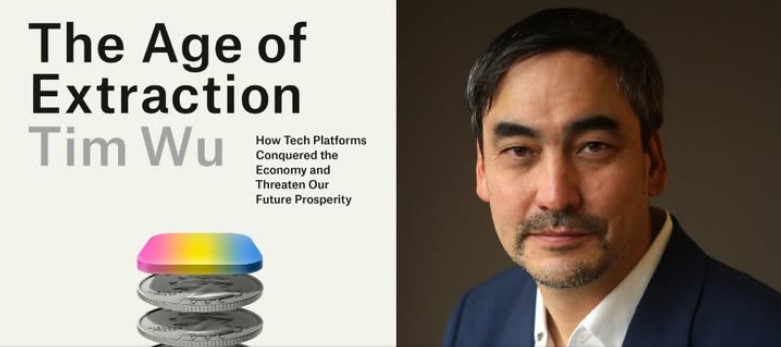DIGITAL LIFE

The latest book by American jurist Tim Wu is a plea against the monopolistic abuses of big tech and a defense of a robust antitrust policy.
In "The Age of Extraction – How Tech Platforms Conquered the Economy and Threaten Our Future Prosperity," the Columbia University law professor shows how the excessive market concentration of big tech harms consumers, suppliers, and even democracy.
"Today's big tech platforms are impressive, fun, and make our lives easier, but they are also designed to be the most advanced tools in history for extracting wealth and resources from the economy," Wu says in the book.
The jurist uses Amazon as an example of how consumers and suppliers are harmed.
In 2014, the average cost for a merchant to sell their products on Amazon was about 19% of revenue (in traditional retail it is 50%). “Sellers were happy, Amazon’s stock was rising, and it seemed that the promise of win-win on the internet was being fulfilled,” writes Wu. To grow and keep its customers and sellers loyal, Amazon subsidized prices and shipping.
Once its market power was established and many competitors had given up or been bought out, Amazon began to “extract” value. It continuously increased the monthly fee and other charges levied on sellers, which reached 30% per sale. It began selling ads that, in practice, functioned as a mandatory fee. Without paying for the ads, the merchant saw their products disappear in searches. With the increase in fees, sellers began to raise their prices, harming consumers.
“By 2023, fees had become less predictable, but on average, they totaled more than 50% of the product's selling price.”
At that time, however, many consumers were already loyal to Amazon Prime and its convenience, and sellers didn't have other marketplaces as large to sell their products. As a result, Amazon continues to extract value at the expense of merchants' margins and buyers' income.
“It’s an undeniable truth that technological change creates wealth. It’s the distribution of that wealth that has always been the tricky part. Often, technological advances have been used to widen, not reduce, economic disparities.”
Wu was one of those responsible for antitrust policy in the Biden administration, as Special Advisor to the President for Competition and Technology Policy, alongside Lina Khan, who was chair of the FTC (Federal Trade Commission), and Jonathan Kanter, then Deputy Attorney General responsible for the Antitrust Division.
The three are the bulwarks of the new progressive antitrust policy, called "neo-Brandeisians," in reference to Supreme Court Justice Louis Brandeis (1856-1941). Brandeis believed that monopolies were inherently harmful and advocated a more assertive antitrust policy to ensure fair competition. In recent decades, a much less interventionist policy had prevailed in the US, in which antitrust measures are only adopted when there is clear evidence of harm to consumers, such as price increases.
In recent years, especially under the Biden administration, but also during Trump's two terms, a more militant stance has been adopted against the excessive market power of big tech companies. The Department of Justice has filed lawsuits against Google, Facebook, Amazon, and other large platforms, accusing them of anti-competitive behavior.
When recommending remedies against the excessive platformization of the economy, the American jurist doesn't stray far from already known solutions: strong antitrust rules, neutrality in the provision of services and non-discrimination, empowerment of countervailing powers (unions, consumers), regulating big tech companies in the same way as public services (electricity, water, highway companies).
He goes further by linking the concentration of power and wealth in the hands of a few companies to the recent proliferation of governments with authoritarian tendencies.
Wu quotes US Senator Estes Kefauver, who, in 1950, warned: “I am not an alarmist, but the history of other nations, where mergers and concentrations have left economic control in the hands of very few people, is too clear to be ignored.”
According to him, a point would be reached where intervention would be necessary to regain control of the economy. “This results in a fascist state or the nationalization of industries and, subsequently, a socialist or communist state.”
For Wu, the path to an authoritarian state “passes through the imbalance of economic power, and a platform economy contributes to this problem.”
According to him, after the systemic extraction of value by platforms, mass resentment arises – and this is the opportunity for autocrats to rise.
As the mentor of the new antitrust warriors, Louis Brandeis, said: “We can have democracy in this country or we can have great wealth concentrated in the hands of a few, but we cannot have both.”
mundophone
No comments:
Post a Comment